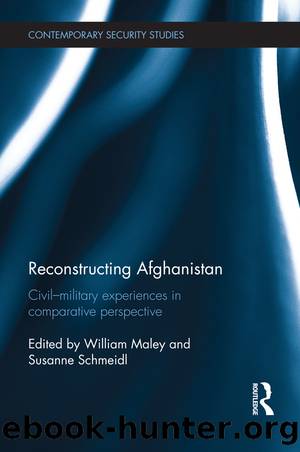Reconstructing Afghanistan by William Maley Susanne Schmeidl

Author:William Maley, Susanne Schmeidl [William Maley, Susanne Schmeidl]
Language: eng
Format: epub
ISBN: 9781138810679
Barnesnoble:
Publisher: Taylor & Francis
Published: 2014-12-03T00:00:00+00:00
8
Civilâmilitary interaction in Afghanistan
The case of Germany
William Maley
Introduction
On Sunday 6 October 2013, Germanyâs military mission in the northern Afghan province of Kunduz finally ended with a ceremony attended by German Defence Minister Thomas de Maizière and Foreign Minister Guido Westerwelle at which its buildings were handed over to the control of Afghan security personnel. This was the culmination of a staged process of transition (inteqal) that had been inaugurated in an announcement by President Hamid Karzai on 22 March 2011. It was ten years to the month since German forces had first arrived.1 The Afghanistan mission had cost 54 German lives, 35 of them in combat.2 From this point onwards, the new German Consulate-General in Mazar-e Sharif, opened in June 2013, was to be the principal focal point for German assistance activities in northern Afghanistan.
Germany and Afghanistan have had a much longer history of interaction than is often appreciated, dating back at least to Wilhelmine times. During the First World War, Germany pursued a kind of Ostpolitik that famously saw it seek to mobilise Pan-Islamic sentiment within the Ottoman Empire against the British,3 but the parallel German involvement in Afghanistan is often overlooked. While there was significant sympathy for Germany in Afghanistan, the Afghan ruler, Amir Habibullah, adopted a position of neutrality, which a German mission headed by Oskar von Niedermayer and Werner Otto von Hentig was unable to displace. During the time of the Weimar Republic, German involvement intensified, not least because Habibullahâs son Amanullah, the occupant of the throne from 1919, was keen to welcome a âthird forceâ to Afghanistan that could help counterbalance the weight of the USSR to the north, and British India to the east. A friendship treaty between Afghanistan and Germany was signed on 3 March 1926.4 While 1933 saw leadership change in both Germany and Afghanistan, with the appointment of Hitler as German Chancellor and the succession of Zahir Shah to the Afghan throne following the assassination of his father, the bilateral relationship remained substantially undisturbed. During the Second World War, however, the Afghan government again remained neutral despite the steadfast efforts of Nazi Germany to win it over.5 After the defeat of Nazism, Afghanistan figured far less prominently in the foreign policy of the new Federal Republic of Germany, which had other preoccupations; but German academics continued to write about Afghanistanâs society, economy, languages and culture. Germany received Afghan refugees following the Soviet invasion of Afghanistan in December 1979, and subsequently had a particular diplomatic involvement in Afghanistan in 1996 and 1997 when a Foreign Ministry official, Dr. Norbert Holl, served as Head of the United Nations Special Mission to Afghanistan.6 Neither this history nor these contacts in any way ordained that Germany would become heavily involved in Afghanistan after 2001, but they did form part of the context of connections in which decisions about Germanyâs involvement would be taken.
Far more salient an influence on Germany policy has been the alliance relationship between Germany and the United States. Ever since NATO was
Download
This site does not store any files on its server. We only index and link to content provided by other sites. Please contact the content providers to delete copyright contents if any and email us, we'll remove relevant links or contents immediately.
| Africa | Americas |
| Arctic & Antarctica | Asia |
| Australia & Oceania | Europe |
| Middle East | Russia |
| United States | World |
| Ancient Civilizations | Military |
| Historical Study & Educational Resources |
Machine Learning at Scale with H2O by Gregory Keys | David Whiting(4313)
Never by Ken Follett(3955)
Fairy Tale by Stephen King(3396)
Oathbringer (The Stormlight Archive, Book 3) by Brandon Sanderson(3214)
The Man Who Died Twice by Richard Osman(3077)
Will by Will Smith(2919)
Rationality by Steven Pinker(2363)
Can't Hurt Me: Master Your Mind and Defy the Odds - Clean Edition by David Goggins(2339)
The Dark Hours by Michael Connelly(2307)
Friends, Lovers, and the Big Terrible Thing by Matthew Perry(2230)
The Dawn of Everything: A New History of Humanity by David Graeber & David Wengrow(2208)
Principles for Dealing With the Changing World Order: Why Nations Succeed and Fail by Ray Dalio(2054)
A Short History of War by Jeremy Black(1848)
HBR's 10 Must Reads 2022 by Harvard Business Review(1844)
Go Tell the Bees That I Am Gone by Diana Gabaldon(1757)
A Game of Thrones (The Illustrated Edition) by George R. R. Martin(1744)
Kingdom of Ash by Maas Sarah J(1677)
515945210 by Unknown(1666)
443319537 by Unknown(1557)
